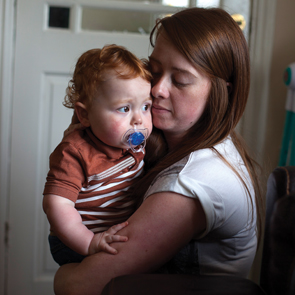The social action wing of the Church in England and Wales this week rejected government suggestions that employment alone is the key to solving the poverty crisis faced by millions of Britons today.
Caritas Social Action Network (Csan), which includes more than 25 Catholic charities working to alleviate child poverty, called for greater efforts to address low pay and the hardship it causes.
“It is extremely important to note that employment on its own is not a solution to poverty,” said Csan in its response to the Government’s Draft Child Poverty Strategy 2014-17, on which a consultation was launched earlier this year by the departments of Education and of Work and Pensions.
Csan supports the draft strategy’s statement that worklessness and low earnings are root causes of poverty and welcomes the Government’s aspiration to combat child poverty by helping families into employment and tackling low pay. However it says that more needs to be done to reform the labour market to rectify the causes of poverty suffered by those in work and help ensure that work pays an adequate wage.
“Work does not provide a guaranteed route out of poverty in the UK. In-work poverty has increasingly become a reality for families in recent years. In many cases low-paid workers struggle to meet basic food, housing and utility costs,” added Csan.
The organisation points out that there are 6.7 million working families living below the poverty line, which is more than the number of workless and retired families in poverty combined (6.3 million). In addition, it is estimated that 66 per cent of children growing up in poverty live in a family where at least one member works.
The Government sets the poverty line at 60 per cent of the median United Kingdom household income. By this definition there are some 13 million people defined as living in poverty in the country.
The increase in the working poor is shown in the number of working households now claiming housing benefit. Research from House of Commons Library found that the number of housing benefit claimants in work rose by 58 per cent from May 2010 to the end of last year.
“These figures paint a picture about poverty in the UK that flies in the face of common rhetoric that people in poverty are out of work and ‘scroungers’,” according to Csan, which described the necessity for food banks as “an unacceptable feature of life in the UK”, adding: “We are concerned that a significant proportion of referrals were a result of benefit delays or changes.”
It suggests that measures to help families meet food costs outside of school terms should be made a priority in order to tackle malnutrition at home and voices concerns about the removal of the spare-room subsidy and the impact this is having on the finances of low-income families.
Csan also condemns zero-hours contracts, which, although they can be useful to both employer and some employees in being flexible, can often cause in-work poverty and exacerbate financial pressures because the irregular hours makes budgeting difficult and affects benefit claims and access to credit.
Meanwhile, research this week released by charity, Save the Children, showed that British youngsters living in poverty could reach five million by 2020.
The chief executive of Csan, Helen O’Brien, said: “The fact that children in one of the world’s richest countries live in poverty is shocking enough – but what is even more worrying is that two-thirds of those children live in working families.”
Photo: Save the Children




 Loading ...
Loading ...